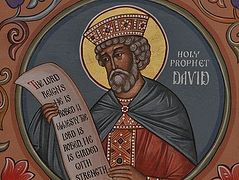Prayer
In his works, St. Stephan attaches great significance to the importance and necessity of prayer in the work of the salvation of the soul. The labor of prayer is necessary for freeing oneself from the authority of the devil and reaching the Kingdom of Heaven. Prayer is the core and breath of the spiritual life. Conversely, “in whom this breath has ceased, the spiritual life has died out in him.” Without prayer, any virtue will weaken. Many spiritual infirmities are directly connected to a lack of prayerful activity in the life of man. “Why does a man lose heart? Because he ceases to pray,” teaches Fr. Stephan. The lack of prayer is one of the causes of man’s falling into vain, and even worse, soul-damaging affairs.
Definition of prayer
In the writings of St. Stephan, we can find the following definitions of prayer:
- Prayer is conversation with God
- Prayer is the turning the mind and heart to God, the union of the soul with God
- A petition for God’s mercy; also praise and thanksgiving to God
- Referencing St. Philaret of Moscow: “Prayer is the breath of the immortal spirit” and “the breath of the inner man”
The essence of the work of prayer
The essence of prayer, according to the teaching of St. Stephan, should be the turning of the mind and heart to God, without which “external prayer will be like a soulless, stillborn fruit of the womb.” What is required from many is not some outward action, like the position of the body or the number of prayers, but the participation of the heart. The saint also clearly indicates the need to go to the services. St. Stephan severely upbraids those who neglect the services. A lack of desire to go to the church of God is evidence of a lack of desire to serve God, and therefore makes such a man a slave of the devil.
Types of prayer
 Speaking of prayer, St. Stephan doesn’t emphasize the prayer rule, but talks about the work of prayer as such. At the same time, it should be noted that Fr. Stephan himself celebrated the daily cycle of services and read akathists every day.
Speaking of prayer, St. Stephan doesn’t emphasize the prayer rule, but talks about the work of prayer as such. At the same time, it should be noted that Fr. Stephan himself celebrated the daily cycle of services and read akathists every day.
Elder Stephan gives considerable attention to the Jesus Prayer. He doesn’t consider the work of unceasing prayer to be something exclusively for monastics, but on the contrary, of every God-loving soul desiring to find salvation. Unceasing prayer is, on the one hand, a result of fervently forcing oneself and constant exercise in prayer and the purification of the heart; on the other hand, it is a special gift of God. But for those who haven’t received the skill of praying in the spirit at all times, St. Stephan exhorts them to pray more often with verbal prayer, reinforcing this prayer with prostrations. The Jesus Prayer is an important means of battling with any passion.
A separate important means that helps a Christian strive for the virtuous life and for salvation is, according to St. Stephan, “the singing of psalms and other sacred hymns.” He contrasts spiritual hymns with worldly creativity, considering that they “can not only disperse boredom, but also bring joy.” Some of his works have separate chapters of individual poems and hymns, most likely written by Fr. Stephan himself. The books, Christian Psalmody and Hymnody and Hymns of a Man of God for the Glory of God include a complete collection of St. Stephan’s musical creativity with an introductory word before each hymn.
Conditions for successful prayer
For prayer to be heard by God, to be effective, it should be accompanied by works of mercy and almsgiving according to our ability. Conversely, if a man prays while having hatred for another and an unmerciful heart, that prayer is unto sin. And prayer from an impure heart, from an uncontrite spirit, with petitions for vain and earthly things to the detriment of the spiritual, is also senseless.
Fasting and temperance
No less important means in prayerful work and acquiring the virtuous life are the temperance of the belly and Godly-wise silence. Even in the Garden of Eden, while enjoying the paradisiacal life, man was obliged to have temperance in food—this was the foundation of his prosperous life. So in this earthly life, temperance is an important element of the spiritual life: “As pleasing the stomach is the beginning of all evil … so temperance in food and the occupation of the mind with spiritual reflection is the foundation of the virtues and the path to beatitude.” Temperance, according to St. Stephan, makes a man submissive to God, teaches prudence, and therefore gives a man the necessary means for charity, by which he “is vouchsafed grace from God and men.” Fr. Stephan calls us to love the abstemious life, free of all worldly cares, in which a man acquires nothing superfluous, and this, together with what God Himself gives, will guide a man to every virtue.
Other means of asceticism
St. Stephan quite often indicates the need to compel ourselves to silence and the guarding of our lips even amidst worldly cares. Silence leads a man to heartfelt contrition, which together with tears will bring joy to the soul. Together with silence, we must have a paucity of the necessities of life, accustoming ourselves to contentment with simple food and beleaguering the body with frequent kneeling before God and vigil. Moreover, he instructs us never to give this up, even when a man can achieve spiritual perfection.
Moderation in food and sleep, wearying the body with vigil and prayer are also important tools in the effort to preserve a chaste life. Without this, a Christian will inevitably have to “struggle with the lust of the flesh … and fall into sinful impurity.”
Note that by vigil St. Stephan means not only nighttime prayer as such, but prayer combined with reading and reflection on the revelations of the Lord expressed in Holy Scripture and the Patristic instructions. The mind of such a man learns to despise all things earthly, and his soul is inflamed with the desire to acquire only eternal goods. In this case, the soul of man becomes “elusive to the nets of the murderer of souls [the devil],” the saint concludes.
As we see, for St. Stephan, the most important tasks are of a practical nature, aimed at spiritual transfiguration and the salvation of man, and not the problems of dogmatic theology and philosophical reasonings. We see that Fr. Stephan builds a consistent system of means that are formed into the stages of achieving the moral and ascetic ideal and the salvation of the soul. The beginning is man’s response to the word of God addressed to him. The first sign and indication that a man has started upon the narrow path of salvation is the appearance of godly sorrow and the fear of God. Taking root in the heart, they lead a man into humility and a contrite state of spirit, which is a sign of the beginning of spiritual renewal. The crown of spiritual growth is the depth of repentance, which leads a man into the vision of the revelations of God and the Kingdom of Heaven. But even if a man has not attained the heights of the spiritual life, he must not give in to despair, but incrementally do everything possible in order to fully follow Christ.





